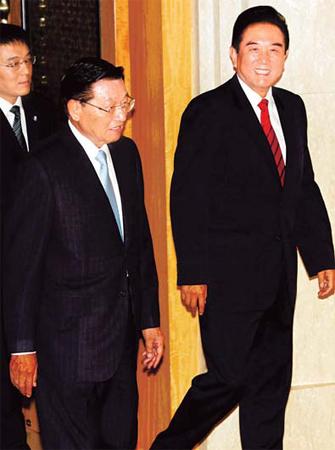CHONGQING - The Chinese mainland and Taiwan are set to sign a historical trade pact on Tuesday afternoon, a significant step to bring economic ties closer and usher in a new era for the development of cross-Straits relationships.

Chen Yunlin (right), chairman of China s Association for Relations Across the Taiwan Straits, and his counterpart, Chiang Pin-kung, chairman of the Taipei-based Straits Exchange Foundation, arrive in Chongqing on Monday for a welcome ceremony ahead of a cross-Straits meeting to create an economic cooperation framework agreement. [Agencies]
Chen Yunlin, president of the Beijing-based Association for Relations Across the Taiwan Straits (ARATS), welcomed his counterpart Chiang Pin-kung, chairman of the Taipei-based Straits Exchange Foundation (SEF) in Southwest China's Chongqing municipality on Monday.The two are the top semi-official negotiators for the two sides and will sign the Economic Cooperation Framework Agreement (ECFA), which focuses on tariff concessions and easier market access, and also an agreement on intellectual property protection.
"The inking of the ECFA is a strategic move by both sides of the Straits to improve the competitiveness of the Chinese in the face of new problems arising from the globalization of the world economy and regional integration," Chen said.
The free-trade deal will provide Taiwan companies tariff advantages in some 530 categories of goods for mainland export, and mainland companies will receive advantages in some 260 categories in the Taiwan market, earlier reports said.
The specific text of the agreement will be published on SEF's official website after the signing ceremony on Tuesday.
The two sides have also agreed to begin follow-up talks on expanded merchandise and service trade, and reciprocal investment protection within six months of the ECFA taking effect.
"The signing of the ECFA will usher in a new era of mutual trust and negotiation for the two sides," Chiang said in Taiwan before his departure for Chongqing.
He said the ECFA will offer fair opportunities for Taiwan to compete with member states of the Association of Southeast Asian Nations (ASEAN) in the vast mainland market. The deal will also make it much easier for Taiwan to transform into a regional trade hub.
Since the free trade pact between the mainland and ASEAN took effect this January, Taiwan has been deeply concerned about being marginalized.
It is the fifth round of Chen-Chiang talks since Ma Ying-jeou and the Kuomintang came into power in Taiwan in 2008.
A total of 12 agreements and two consensuses have been reached in the previous four rounds of talks, which helped realize direct mail, transport, trade, two-way tourism and investment across the Straits.
"We have achieved so much in such a short time. The agreements represent the common interests of the people on both sides of the Straits, and they show the people's common aspirations for peace, development and mutual benefits," Chen said.
After the talks, Wang Yi, head of the State Council's Taiwan Affairs Office, will meet the SEF negotiators.
Bo Xilai, Party Secretary of Chongqing, is also scheduled to meet the representatives from the two sides on Wednesday morning.
China Daily





